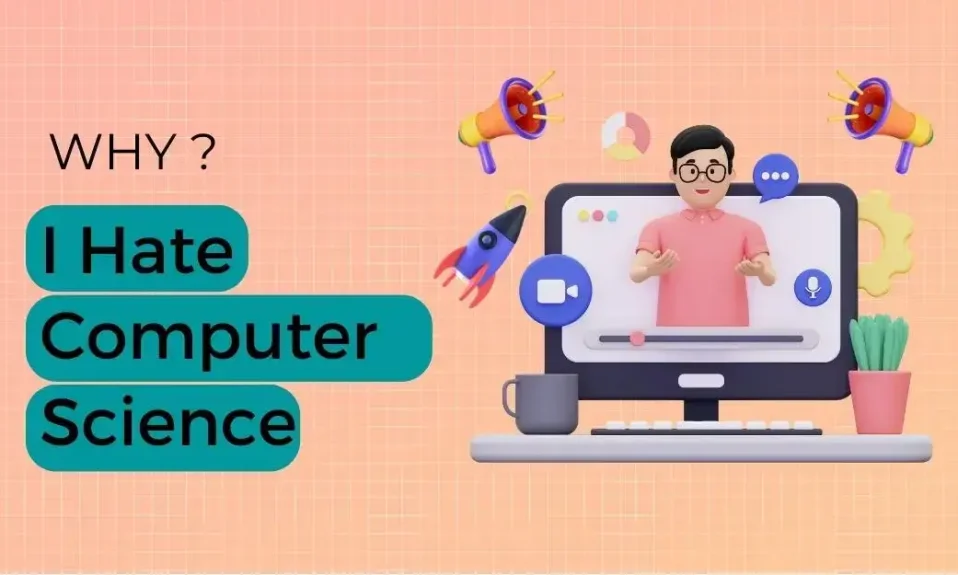
I hate computer science.
Computer science is the study of the theoretical foundations of information processing and the practical techniques for implementing information processing systems. It is a branch of applied mathematics that focuses on the design, analysis, implementation, and application of algorithms and data structures. Computer science also encompasses the study of computer hardware and software, as well as the theory of computation and information theory.
Computer science is not an academic discipline in itself, but rather a collection of academic disciplines and fields of study that deal with all aspects of computers and information processing. These disciplines include:
- Algorithms and data structures: The study of algorithms and data structures is at the core of computer science. Algorithms are a set of instructions that a computer follows to solve a problem. Data structures are ways of organizing data so that it can be efficiently stored and accessed.
- Computer architecture: The study of computer architecture is concerned with the design and implementation of computer hardware. This includes the study of processors, memory, and input/output devices.
- Software engineering: Software engineering is the study of the design, development, testing, and maintenance of software. It is concerned with ensuring that software is reliable, efficient, and easy to use.
- Theory of computation: The theory of computation is concerned with the mathematical foundations of computation. It studies the capabilities and limitations of computers, and the problems that can and cannot be solved by computers.
- Information theory: Information theory is concerned with the quantification, storage, and communication of information. It studies the fundamental limits of how much information can be transmitted in a given amount of time or space.
Computer science is a rapidly growing field with a wide range of applications. It is used in a variety of industries, including:
- Software development: Computer scientists design, develop, and test software.
- Hardware engineering: Computer scientists design and develop computer hardware.
- Information security: Computer scientists develop security systems to protect computers and data from unauthorized access.
- Data science: Computer scientists use data science techniques to extract insights from large datasets.
- Artificial intelligence: Computer scientists design and develop artificial intelligence (AI) systems.
Computer science is a challenging and rewarding field that offers a wide range of career opportunities. If you are interested in computers and technology, then computer science may be the perfect field for you.
Why Do Students Hate Computer Science?
Computer science is a challenging and demanding field of study, and it’s no surprise that some students find it difficult to love. Here are some of the most common reasons why students hate computer science:
- The material is hard to understand. Computer science concepts can be complex and abstract, and students who don’t have a strong foundation in math and logic may struggle to keep up.
- The course load is demanding. Computer science majors typically have to take a lot of difficult classes, and they may also have to complete a significant amount of programming assignments.
- The field doesn’t seem relevant to real life. Some students feel that computer science is too theoretical and doesn’t teach them the skills they need for a successful career.
- The learning curve is steep. It takes time and effort to become a proficient programmer, and some students may not be willing to put in the necessary work.
Despite these challenges, computer science can be a rewarding field of study for those who are willing to put in the effort. With hard work and dedication, students can learn to master the material and develop the skills they need to succeed in a career in computer science.
Why Computer Science Can Be So Difficult for Beginners?
Computer science is a challenging field of study, but it can be especially difficult for beginners. Here are some of the reasons why:
- The need to learn multiple programming languages. There are hundreds of programming languages in use today, each with its own unique syntax and semantics. This can be a daunting task for beginners, who may not know where to start or how to choose the right language for their needs.
- The complexity of computer science concepts. Computer science concepts can be very complex, and it can take a lot of time and effort to master them. This can be discouraging for beginners, who may feel like they are never going to understand the material.
- The lack of immediate feedback. In many other subjects, students can get immediate feedback on their progress. For example, if a student writes a paper, they can get feedback from their professor or classmates. However, in computer science, it can be difficult to tell if a student is actually learning anything or just spinning their wheels. This can be frustrating for beginners, who may not know if they are on the right track.
Despite these challenges, computer science can be a rewarding field of study. With hard work and dedication, beginners can overcome these challenges and become successful computer scientists.
Here are some additional tips for beginners in computer science:
- Start with a simple programming language. There are many different programming languages to choose from, but some are more beginner-friendly than others. For example, Python and Java are two good choices for beginners.
- Find a good tutorial or course. There are many resources available to help beginners learn computer science. There are online tutorials, books, and even courses offered by universities and colleges.
- Don’t be afraid to ask for help. If you get stuck, don’t be afraid to ask for help from a friend, family member, or teacher. There are also many online forums where you can get help from other beginners.
- Practice, practice, practice. The best way to learn computer science is to practice. The more you practice, the better you will become.
With hard work and dedication, anyone can learn computer science.

Computer Science: A Major with a Massive Workload
Computer science is a demanding major that requires students to spend a lot of time on projects and assignments. In fact, students can expect to spend an average of 40 hours per week in class and 20 hours per week on homework and projects outside of class. This can be a lot of work, but it is also an incredibly rewarding major that can lead to high-paying jobs in the tech industry.
One of the reasons why computer science is such a demanding major is because the curriculum is very challenging. Students are required to learn a wide range of topics, including programming, algorithms, data structures, and operating systems. These topics can be difficult to master, and students will need to spend a lot of time practicing and working on problems in order to succeed.
Another reason why computer science is a demanding major is because the job market is very competitive. There are a lot of qualified computer science graduates out there, and companies are only hiring the best of the best. This means that students need to have a strong academic record and a portfolio of impressive projects in order to stand out from the crowd.
If you are considering majoring in computer science, you should be prepared for a lot of hard work. However, if you are up for the challenge, you can reap the rewards of a rewarding career in the tech industry.
Irrelevant Subjects in College
Many college students find themselves taking classes that are irrelevant to their major. This can be frustrating and time-consuming, as students are forced to learn material that they will never use in their future careers.
There are a few reasons why colleges require students to take irrelevant subjects. One reason is to provide a well-rounded education. By exposing students to a variety of subjects, colleges hope to help them develop critical thinking skills and a broad range of knowledge.
Another reason for requiring irrelevant subjects is to weed out students who are not academically prepared. By requiring students to take challenging courses, colleges can identify those who are not likely to succeed in their chosen major.
However, there are also some drawbacks to requiring irrelevant subjects. First, it can be a waste of time and money for students who are not interested in the material. Second, it can lead to students feeling frustrated and discouraged, which can negatively impact their academic performance.
Ultimately, the decision of whether or not to require irrelevant subjects is a complex one. There are both benefits and drawbacks to consider, and the best decision may vary depending on the individual student and the college.
Computer Science Can Lead to Isolation and Anxiety
The long hours of coding that are often required in computer science can lead to isolation and anxiety. Developers may spend days, weeks, or even months working on a project without interacting with other people. This can lead to feelings of loneliness and disconnection, which can in turn contribute to anxiety and depression.
It is important for computer science professionals to find ways to break up their isolation and connect with others. This could involve joining a coding community, attending conferences, or simply taking breaks from work to socialize with friends and family. By taking steps to avoid isolation, computer science professionals can protect their mental health and well-being.
Here are some tips for avoiding isolation in computer science:
- Join a coding community. There are many online and offline coding communities where you can connect with other developers. This is a great way to share ideas, get help with projects, and make friends.
- Attend conferences. Conferences are a great way to learn about new technologies and meet other computer science professionals. They can also be a lot of fun!
- Take breaks from work to socialize. Make sure to take breaks from work to spend time with friends and family. This will help you stay connected and avoid feeling isolated.
- Get help if you need it. If you are feeling isolated or anxious, don’t be afraid to seek help from a professional. There are many resources available to help you cope with these challenges.
By following these tips, you can help to ensure that your career in computer science is both fulfilling and rewarding.
Testing and Debugging: A Time-consuming and Frustrating Process
Debugging is the process of finding and fixing errors in software code. It can be a time-consuming and frustrating process, as it often involves hours of trial and error. When debugging, users may not be able to get up and walk away from their work, as they need to stay focused until they find the source of the error and fix it. This can be especially challenging when debugging complex software applications.
There are a number of factors that can make debugging difficult. One is the complexity of software code. As software applications become more complex, they become more difficult to debug. Another factor is the lack of documentation. When software code is not well-documented, it can be difficult to understand how it works, which makes debugging even more challenging.

Despite the challenges, debugging is an important part of the software development process. By finding and fixing errors in software code, developers can ensure that their applications are free of bugs and run smoothly.
Here are some tips for improving the debugging process:
- Use a debugger. A debugger is a tool that can help you step through your code line by line, so you can see what is happening at each step.
- Write unit tests. Unit tests are small tests that verify the functionality of individual units of code. They can help you identify errors early in the development process.
- Use a version control system. A version control system allows you to track changes to your code over time. This can be helpful if you need to revert to a previous version of your code to fix a bug.
- Get help from others. If you are stuck, don’t be afraid to ask for help from other developers. There are many online forums and communities where you can get help with debugging.
By following these tips, you can improve the debugging process and make it less time-consuming and frustrating.
Why Some People Hate Coding
Coding is a complex and repetitive task that can be tedious and boring for some people. This can take away from the more interesting aspects of programming, such as design and problem solving. However, these skills can be learned through practice, and coding is often necessary for efficiency in writing code later on.
Here are some of the reasons why some people hate coding:
- It can be difficult to learn.
- It can be time-consuming.
- It can be frustrating when things don’t work the way you expect them to.
- It can be repetitive and boring.
- It can be difficult to debug.
If you are one of the people who hates coding, there are a few things you can do to make it more enjoyable:
- Find a coding language that you enjoy working with.
- Find a project that you are passionate about.
- Work with a partner or group of people who can help you learn and troubleshoot.
- Take breaks when you need them.
- Don’t be afraid to ask for help.
Remember, coding is a skill that takes time and practice to learn. If you stick with it, you will eventually start to enjoy it.
Why Commenting Your Code is Important
Comments are not just for students. They are also important for teachers and other developers who may need to read and understand your code. Comments can help explain the purpose of your code, how it works, and any potential risks or limitations.

Benefits of Commenting Your Code
- Increased readability: Comments can make your code easier to read and understand, both for yourself and for others. This can save time and frustration when debugging or making changes to your code.
- Improved maintainability: Comments can help make your code more maintainable by providing documentation that explains what the code does and why it was written that way. This can be especially helpful if you need to come back to your code after a long time or if you are working with a team of developers.
- Reduced errors: Comments can help you avoid errors by reminding you of the purpose of your code and by providing documentation that can be used to check your work.
- Improved SEO: Comments can help improve the SEO of your code by providing additional information about what your code does and how it works. This can help your code rank higher in search results, making it more discoverable by potential users.
How to Write Effective Comments
- Use complete sentences: Comments should be written in complete sentences that are easy to understand.
- Use descriptive names: Give your variables and functions descriptive names that accurately reflect their purpose.
- Place comments near the code they are describing: Comments should be placed as close as possible to the code they are describing. This will make it easier for readers to find the information they need.
- Use consistent formatting: Use consistent formatting for your comments, such as using a specific font and color. This will make your code easier to read and understand.
How Much Commenting is Enough?
The amount of commenting that is necessary will vary depending on the complexity of your code. However, as a general rule of thumb, you should comment any code that is not self-explanatory. This includes code that is complex, uses unusual techniques, or is not well-documented.
Conclusion
Commenting your code is an important part of software development. It can help improve the readability, maintainability, and error-proneness of your code. It can also help improve the SEO of your code, making it more discoverable by potential users. By following the tips in this article, you can write effective comments that will make your code easier to understand and use.
Frequently Asked Questions (FAQ)
Should You Quit Computer Science If You Don’t Like Programming?
Many people are drawn to computer science because they love computers and programming. However, what if you find that you don’t actually enjoy programming? If you’re a junior in college and you’re thinking about quitting computer science, here are a few things to consider:
- Do you still love computers? Even if you don’t enjoy programming, you may still love computers and the technology industry. If so, there are many other career paths in computer science that don’t require a lot of programming, such as user experience design, information architecture, and project management.
- Are you willing to put in the work? Even if you don’t enjoy programming, you may still be able to succeed in computer science if you’re willing to put in the hard work. It takes a lot of time and effort to learn how to program, but it’s definitely possible.
- What are your other options? If you decide to quit computer science, what other career paths are you interested in? It’s important to do your research and explore your options before making a decision.
Ultimately, the decision of whether or not to quit computer science is up to you. However, if you’re struggling with the decision, it may be helpful to talk to a career counselor or a trusted friend or family member.
What type of people are suited for computer science?
Computer science is a field that is constantly evolving, and it requires people who are passionate about learning and solving problems. If you are interested in computer science, you should have the following qualities:
- Problem-solving skills: Computer scientists are constantly faced with new challenges, so they need to be able to think critically and come up with creative solutions.
- Analytical skills: Computer scientists need to be able to break down complex problems into smaller, more manageable pieces.
- Attention to detail: Computer scientists often work with complex code, so they need to be able to pay attention to detail and catch errors.
- Communication skills: Computer scientists often work as part of a team, so they need to be able to communicate effectively with others.
- Self-motivation: Computer science is a field that requires a lot of independent learning, so you need to be able to motivate yourself and work on your own.
If you have these qualities, then you may be well-suited for a career in computer science. The field offers many opportunities for those who are passionate about technology and problem-solving.
What types of people don’t suit computer science?
Computer science is a complex and demanding field that requires a variety of skills and personality traits. Some people who may not be well-suited for computer science include:
- Those who prefer to work independently. Computer science is an interdisciplinary field that often requires collaboration with others.
- Those who are not interested in technology. Computer science is constantly evolving, and those who don’t have a passion for learning about new technologies may find the field to be boring.
- Those who lack creativity and problem-solving skills. Computer science requires both creative and logical thinking skills. Those who struggle with either of these skills may find it difficult to succeed in the field.
If you are considering a career in computer science, it is important to be honest with yourself about your skills and personality traits. If you think you may not be well-suited for the field, there are many other rewarding and in-demand careers that you may be better suited for.
Here are some additional tips for determining if computer science is the right career for you:
- Take an online aptitude test or talk to a career counselor to get an assessment of your skills and interests.
- Shadow a computer science professional to get a firsthand look at the day-to-day work of the field.
- Take some computer science courses at a local community college or university.
By doing your research and exploring your options, you can make sure that you choose a career that is a good fit for you.
What is computer science?
Computer science is the study of computers and algorithms to design, develop, and analyze software. It is a broad field that encompasses everything from software development to cyber security to systems analysis.
Computer scientists are involved in many aspects of computing, including:
- Software development: Computer scientists design, develop, and test software programs.
- Cyber security: Computer scientists develop security measures to protect computer systems from cyberattacks.
- Systems analysis: Computer scientists analyze computer systems to identify and solve problems.
- Algorithms: Computer scientists study algorithms, which are step-by-step instructions for solving problems.
- Data structures: Computer scientists study data structures, which are ways of organizing data in a computer.
- Programming languages: Computer scientists design and develop programming languages, which are languages that humans can use to communicate with computers.
Computer scientists must have strong mathematical and analytical skills. They must also be able to think logically and solve problems. In addition, computer scientists must be able to communicate effectively with both technical and non-technical audiences.
Why study computer science?
Computer science is a rapidly growing field with many job opportunities. Computer scientists are in high demand in a variety of industries, including:
- Technology: Computer scientists work for technology companies such as Google, Apple, and Microsoft.
- Finance: Computer scientists work for financial institutions such as banks and investment firms.
- Healthcare: Computer scientists work for healthcare organizations such as hospitals and pharmaceutical companies.
- Government: Computer scientists work for government agencies such as the Department of Defense and the National Security Agency.
Computer science is also a valuable skill for anyone who wants to be involved in the digital world. Whether you want to start your own tech startup, work in a creative field such as video game design or web development, or simply stay up-to-date on the latest technology, computer science can give you the skills you need to succeed.
How to become a computer scientist
To become a computer scientist, you will need to earn a bachelor’s degree in computer science or a related field. Many colleges and universities offer computer science programs, and some even offer online programs.
Once you have earned your degree, you can start your career as a computer scientist. There are many job opportunities available for computer scientists, and the salary range for these jobs is typically very good.
If you are interested in a career in computer science, I encourage you to learn more about the field. There are many resources available online and in libraries. You can also talk to computer scientists who are already working in the field.
What are the most common subjects studied in computer science?
Computer science is an interdisciplinary field that includes elements of electrical engineering, applied mathematics, and logic. It trains students to think recursively and solve abstract problems with logical reasoning. Computer scientists can work in a variety of industries, including software development, hardware development, and data analysis.
Here are some of the most common subjects studied in computer science:
- Discrete mathematics is a subject that deals with sets, functions, relations, and permutations. It is used in computer science and other areas such as the study of algorithms.
- Data structures and algorithms is a subject that involves the study of different types of data structures and algorithms used for solving particular problems. Data structures are the ways in which we store and organize data. An algorithm is a sequence of steps that can be followed to solve a problem.
- Computer architecture and organization is a subject that deals with the design of computer systems. It is concerned with the internal structure of a computer, including its hardware and software. The study of this subject helps in understanding how machines work and what makes them different from each other.
- Operating systems is a subject that covers all the basic concepts and principles of operating systems, from application software interface to the internals of an operating system. It covers various types of operating systems like Windows, Linux, Unix, etc.
- Theory of computation is a subject that studies the properties and limitations of computers. It is an essential part of computer science, and most other disciplines that study computation.
- Databases is a subject of study and a collection of data. A database management system (DBMS) is the software that allows users to access the data, manipulate the data, and report.
These are just some of the most common subjects studied in computer science. The specific courses that you will take will vary depending on the program you choose and your career goals.
Why should you study computer science?
There are many reasons why you should consider studying computer science. Here are a few of the benefits:
- High-paying jobs: Computer scientists are in high demand and can command high salaries.
- Job security: The field of computer science is constantly growing and evolving, so there will always be a need for qualified professionals.
- Creativity and innovation: Computer science allows you to be creative and innovative in solving problems.
- Problem-solving skills: Computer science teaches you how to think logically and solve problems.
- Global opportunities: Computer science is a global field, so you can work anywhere in the world.
If you are interested in a challenging and rewarding career in computer science, then I encourage you to consider studying this in-demand field.
What to Do If You Want to Quit Computer Science
Are you thinking about quitting computer science? If so, you’re not alone. Many students change their majors at some point in their college career. The good news is that it’s perfectly possible to change your major, even if you’ve already started classes.
Here are a few things to keep in mind if you’re considering quitting computer science:
- Don’t feel like you’re locked in. College majors are not set in stone. You can change your major at any time, even if you’ve already started classes.
- Do some research. Once you’ve decided to change your major, take some time to research different options. There are many different majors out there that could be a good fit for you, so don’t be afraid to explore your options.
- Talk to your advisor. Your advisor can help you with the process of changing your major. They can also provide you with guidance and support.
If you’re interested in tech but don’t want to study computer science, there are a few other majors you might want to consider. Information systems management (ISM) and management information systems (MIS) are two good options. These majors offer a focus on technology, but they also require students to develop strong interpersonal skills. This makes them a good fit for students who are interested in working with people and solving problems.
No matter what major you choose, the important thing is to find something that you’re passionate about. If you’re not interested in your major, you’re less likely to succeed. So take some time to explore your options and find a major that you’re excited about.
Here are some additional tips for changing your major:
- Meet with your academic advisor as soon as possible. They can help you assess your current academic standing and make a plan for switching majors.
- Complete a change of major form. This form will vary from school to school, so be sure to check with your advisor for specific instructions.
- Meet with the advisor of your new major. This will help you get a better understanding of the requirements for the major and make sure it’s a good fit for you.
- Update your resume and cover letter. Be sure to highlight your skills and experience that are relevant to your new major.
- Network with people in your new field. This can help you learn more about the career options available and make connections that could lead to job opportunities.
Changing your major can be a daunting task, but it’s definitely possible. With careful planning and execution, you can make the switch and find a major that you’re passionate about.











3 Comments